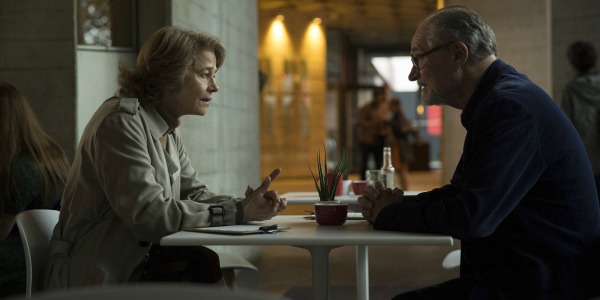THE SENSE OF AN ENDING: A Novel Adaptation That Was Best Left On The Page

Alistair is a 25 year old writer based in Cambridge.…
The feeling of emotional repression was keenly felt in every frame of director Ritesh Batra’s 2013 debut The Lunchbox, a romantic drama about the relationship between two souls in different positions in India’s class system, complicated even further by their age gap – and the fact they’d never actually met in person. Comparisons with Brief Encounter were showered upon the film, making a move to the UK for his second feature production seem like a logical next step.
Dealing with the same feelings of emotional repression, but with the romance switched for guilt, Batra’s adaptation of Julian Barnes’ award winning novel The Sense of an Ending is a perfect fit for the filmmaker. Although the quaint, lovelorn storytelling style of his previous feature has been replaced with something more emotionally complicated and less easy to love, the British setting (where stiff upper lips among the higher classes are something of a national stereotype) helps it feel more of a piece with his previous feature, despite the dramatic departure in terms of narrative content.
Fifty Years of Hidden Feelings
Jim Broadbent stars as Tony Webster, a retired divorcee who still maintains a fantastic relationship with his ex-wife and his daughter, who is currently going through an IVF pregnancy without a partner. Although deeply caring of the two women in his life, he is still perceived by both as a grumpy old curmudgeon- with his former wife ill prepared to hear about an emotional trauma from his past that has just resurfaced.

After a letter arrives informing him that the mother of his ex-girlfriend from fifty years earlier has left him the diary of his old schoolfriend Adrian in her will, he soon finds the past coming back to haunt him. His former girlfriend (played now by Charlotte Rampling) insists that despite legally owning it, he “morally” has no right to look at it, due to the trauma his long forgotten actions bestowed upon her family.
Barnes’ novel unfolded in chronological order, in two distinct parts, both narrated by the character of Tony; first, there was his account of his school days and his relationship in the 1960’s, before a second half where, unfazed by nostalgia, he finally goes back and dissects the actions in his past. Although this isn’t complicated enough to be described as “unfilmable”, it is still an undeniably novelistic way of telling the story, that Batra doesn’t fully manage to overcome when adapting the story for the screen.
In its most successful moments, the chronology of The Sense of an Ending feels straightforward, only to eventually pull the rug from under our feet and prove that different story strands from different time frames are being gradually thrown our way. Batra has enormous fun visualising this, especially in modern day sequences that subtly transform in to heightened dreamscapes, where the figures from Tony’s past can just casually stroll through in his peripheral vision, choreographed in a way that doesn’t call attention to the surreality of the visual premise.
Structure over Story- the new style over substance?
However, the clearer the narrative eventually becomes, it becomes less clear as to why The Sense of an Ending wasn’t told in a more coherent manner between the two time frames, instead of gradually spoon feeding information. For a film that feels so calculated in its chronology screwing plotting, it winds up feeling underwritten; it coasts by on its quasi-mysterious elements, only for the eventual reveal to not be fully revealed, leaving the audience to either try to place the final piece of the jigsaw puzzle together or merely assume that the worst has happened. This may be keeping true to the source material, but the way it unfolds on screen is proof that the story hasn’t translated too well between the two mediums.

It seems like screenwriter Nick Payne (a playwright in his screenwriting debut) spent more time during the writing process mapping out how best to unfold the onslaught of dramatic revelations, as opposed to developing believable characters to attach these revelations to. This is an unusual criticism to level at a writer who has received universal praise for his prior stage work, especially the attention to detail he affords his characters. His work has proved to be catnip for high calibre actors – Jake Gyllenhaal, for example, recently appeared in the lead role of his play Constellations on Broadway.
Payne’s success on the stage is the likeliest factor that has attracted the stellar ensemble cast of respected character actors here- more so than the prestige book adaptation, or the involvement of a critically acclaimed director on his sophomore feature. It is unfortunate that the roles they have been given are underwritten, as they are all merely pawns who have to act in accordance with whichever revelation is to be repressed or unleashed at any given moment.
Actors like Broadbent and Rampling can never be dull to watch – but they can be frustrating when you know their performances are being repressed by the narrative constraints, more so than the feeling of emotional repression that they are meant to be portraying.
Conclusion
Batra should be commended for following his simplistic debut feature with a story altogether more ambitious – even if it does mark his second epistolary narrative in a row. However, it is impossible to shake the feeling that The Sense of an Ending makes more sense as a novel than a feature film; on screen, it feels like it would be impossible to accurately convey the emotional repression of Julian Barnes’ prose in a way that doesn’t feel underwritten when placed atop a narrative spanning fifty years. It is a commendable effort from both director and cast, but it can’t be viewed as anything other than an admirable failure at best.
Which novel adaptations didn’t translate to the screen? Tell us in the comments below!
The Sense of an Ending was released in the UK on April 14, 2017 and was released in the United States on March 10, 2017. For all international release dates, see here.
Does content like this matter to you?
Become a Member and support film journalism. Unlock access to all of Film Inquiry`s great articles. Join a community of like-minded readers who are passionate about cinema - get access to our private members Network, give back to independent filmmakers, and more.
Alistair is a 25 year old writer based in Cambridge. He has been writing about film since the start of 2014, and in addition to Film Inquiry, regularly contributes to Gay Essential and The Digital Fix, with additional bylines in Film Stories, the BFI and Vague Visages. Because of his work for Film Inquiry, he is a recognised member of GALECA, the Gay & Lesbian Entertainment Critics' Association.













